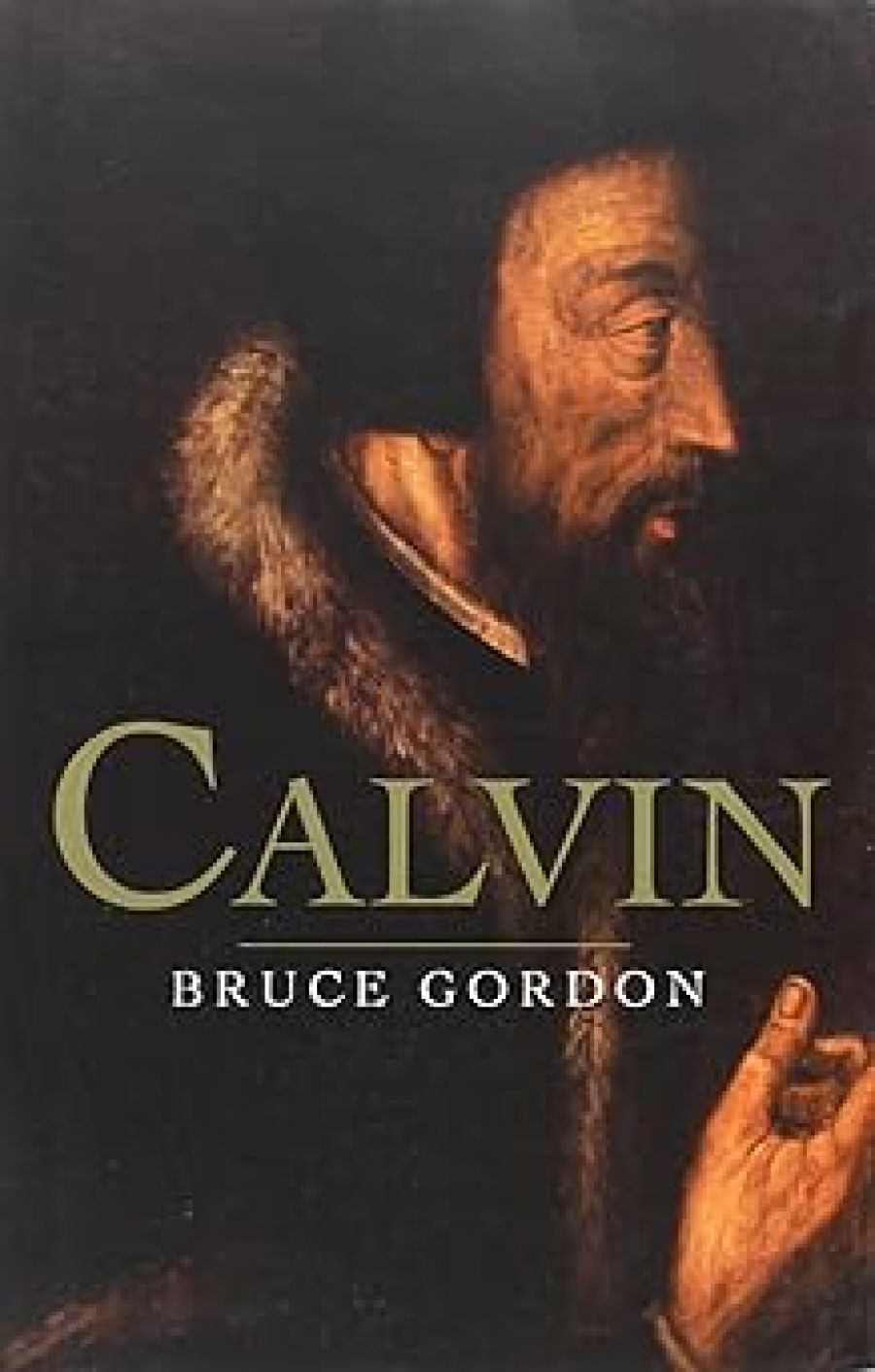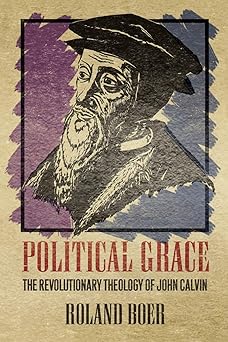
- Free Article: No
- Contents Category: Biography
- Review Article: Yes
- Article Title: Calvin in a dappled light
- Article Subtitle: New perspectives in his quincentenary year
- Online Only: No
- Custom Highlight Text:
John Calvin has not had a good press among the general or even the educated public. Marilynne Robinson caricatures the popular view: ‘an eighteenth-century Scotsman, a prude and obscurantist with a buckle on his hat, possibly a burner of witches, certainly the very spirit of capitalism.’ Even Les Murray, who of course knows a lot of ‘religious stuff’, in a recent poem (‘Visiting Geneva’), addresses ‘John Calvin, unforgiver / in your Taliban hat’. The reasons are, no doubt, complex. Calvin has mistakenly been given sole responsibility for the fate of Michael Servetus. His relationship with Geneva has been misunderstood. Predestination has been seen as the centrepiece of his theological system, when it is questionable whether one can speak of a ‘system’ at all.
- Book 1 Title: Calvin
- Book 1 Biblio: Yale University Press, $79.95 hb, 416 pp
- Book 1 Cover Small (400 x 600):

- Book 2 Title: Political Grace
- Book 2 Subtitle: The revolutionary theology Of John Calvin
- Book 2 Biblio: Westminster John Knox Press, US$24.95 pb, 148 pp
- Book 2 Cover Small (400 x 600):

How, in view of all this, fares Bruce Gordon (Professor of Reformation History, Yale Divinity School) in Calvin’s quincentenary year? He does not resort to shifting the centre of attention from the man to the thought. This is not a study of Calvin’s theology, though his theological preoccupations emerge from the narrative at the appropriate places: with the first edition of the Institutes (Basle, 1536), with his path-breaking commentary on Romans (1540) and so on. Gordon sustains the narrative flow throughout.
Another danger in a biography much ‘focused upon the ebb and flow of [its subject’s] contacts’ is that it will turn into a general history. We learn much about those contacts (Melanchthon and Bullinger, Zwingli’s successor in Zurich, for example) and about the places important to Calvin’s career (Basel, Strasbourg, Berne, Zurich and, of course, Geneva) and their tangled relationships, yet Gordon evades the danger. Indeed, on some subjects, the background of Servetus’s thought, for example, we could afford to learn more. Only at the end, with the complex politics of sixteenth-century France on the eve of religious war, does the stream broaden out and the central flow falter.
What picture of Calvin’s life emerges from Gordon’s biography? He was intellectually precocious, gaining an early mastery of the classical languages and literatures and the rhetorical skills that went with them. He could look forward to a career among the educated élite, but his conversion and flight from France under threat of persecution set him on another course. He was left with an ambiguity: how were the classical and the Christian to be related in his thought? ‘Exile was his defining experience.’ That made him a preferred teacher of Protestant fugitives everywhere. The faithful, Calvin wrote in his Psalms commentary, see in the Jews’ experience of exile their own life, as in a mirror. Calvinism, H.A. Oberman has said, was a ‘Reformation of the refugees’.
By chance Calvin came to Geneva, an independent city state, already Protestant, prey to conflicting pressures: from France, from Catholic Savoy and the Swiss Confederation. Calvin’s relationship with Geneva was long fraught. Unordained, he became the leading pastor. With his sense of providential calling, his models were the Hebrew prophets and, above all, St Paul, in his difficulties with his churches. After a first crisis in their relations, expelled from the city, he found in Strasbourg a mature Protestant establishment and, in Martin Bucer, a master in institutional leadership.
In the years that followed, back in Geneva, he struggled to create a church polity on the Strasbourg model, amid the factional struggles typical of an early modern city. At the same time, he emerged as a leader of the Europe-wide Reformation. In both spheres, two sides of the historical figure and the man appear. This is at the heart of the Calvin mystery.
He could be a fierce polemicist, drawing a hard line against critics and opponents. This side is apparent in his vicious attacks on the so-called Nicodemites, those in France who, while accepting inwardly the Reformed faith, still participated in Catholic ceremonies. He dealt likewise with the French ‘evangelicals’. These, the most prominent among them in the circle of Marguerite de Navarre, the king’s sister, adopted a fluid, mystical and contemplative form of reformed faith. Calvin had once been associated with them. Now he showed a ‘visceral hatred for compromise’.
On the other hand, especially in relations with other Protestant leaders, he could be flexible, pragmatic, understanding. The unity of the Reformed, despite doctrinal differences, was of high value to him. Thus he stood by the bond with Bullinger, despite the latter’s rejection of his doctrine of predestination, which, if not the key to his theology, was an important element in it. The theme of inner tension in Calvin’s thought is not new in the Calvin literature. It appeared in the best-known book about him in the last part of the twentieth century, William Bouwsma’s John Calvin: A Sixteenth-Century Portrait (1988). In a bibliographical note, Gordon calls Bouwsma’s study ‘overly psychological’, but the tension Bouwsma identifies is as much cultural as psychological. Anxiety in late-medieval culture arose from the twin fears of openness and constraint, symbolised by the images, respectively, of the abyss and the labyrinth.
At the end of his life strains emerged, with colleagues and perhaps within himself, over how to handle the crisis of religious conflict in France, a struggle between militancy and endurance. Here we might introduce Roland Boer’s book, in which the tension is between the radical and conservative Calvins, the revolutionary and reactionary. Boer (Research Professor in Theology at the University of Newcastle) observes that Calvin was reflecting contradictions in the Bible itself. He sums up his argument: Calvin ‘let the radical political cat peek out of the theological bag only to try his hardest to push it back in and tie the bag up again.’ The substance of the book lies in the close analysis of chosen texts, almost exclusively from the Institutes, and of the Latin terms Calvin uses. The chapter on grace is illustrative. Human depravity is universal. To counter it God’s grace must be radical, total and overwhelming. But Calvin sets boundaries to this revolutionary impulse, as with his doctrine of election which produces an ‘aristocracy of salvation’. The same dynamic applies in his teaching on Christian freedom. Then Boer gives an account, generally convincing, of the last chapter of the Institutes (‘Civil Government’), as it steers a course between anarchy and tyranny.
Boer’s treatment of historical context is not satisfactory. In the beginning he eschews it in favour of close textual analysis. At the end, with a Marxist broad-brush approach, he presents Calvin as one of the ‘great symbolic theorists’ of the transition from feudalism to capitalism. What is missing is any analysis of the governments and societies Calvin actually faced, including those of sixteenth-century France. In a famous passage, Calvin speaks of the restraint exercised on rulers by ‘magistrates of the people’ (populares magis-tratus), including possibly the three estates in their general assemblies. This is a lead that Boer does not pursue.
Geneva is not in the index of this book. To one of ‘the strange breed known as historians’, it is odd to offer a book on Calvin’s politics which does not mention the government with which he had daily dealings for over twenty years. Behind Geneva were the urban Reformations with their diverse solutions to the problem of state-church relations. If he had taken these situations into account, Boer might have written differently about the temporal/spiritual and the public/private divides in Calvin’s thought. For these realities we must return to Gordon.
A biography of Calvin is the first chapter of a larger, more important story: the history of Calvinism, its triumphs and catastrophes. In the biography the threads stop at Calvin’s death in 1564, but they were not broken, they run on, and we know where they run, and how they end. We cannot help reading these endings back into the biography. The tensions in fact continue. The militants had their brief triumphs and lasting catastrophes (Prague, 1620; La Rochelle, 1627). Calvin’s hardness – church discipline, doctrinal strictness – prepared those who had to endure these vicissitudes. Otherwise, would Calvinism have suffered the fate of many promising and attractive religious movements of the Reformation era: decimation and extinction?


Comments powered by CComment